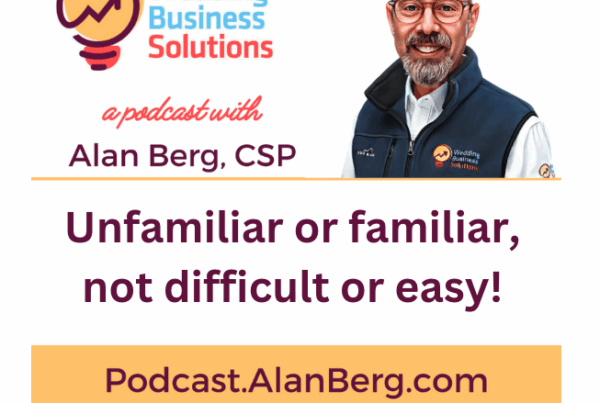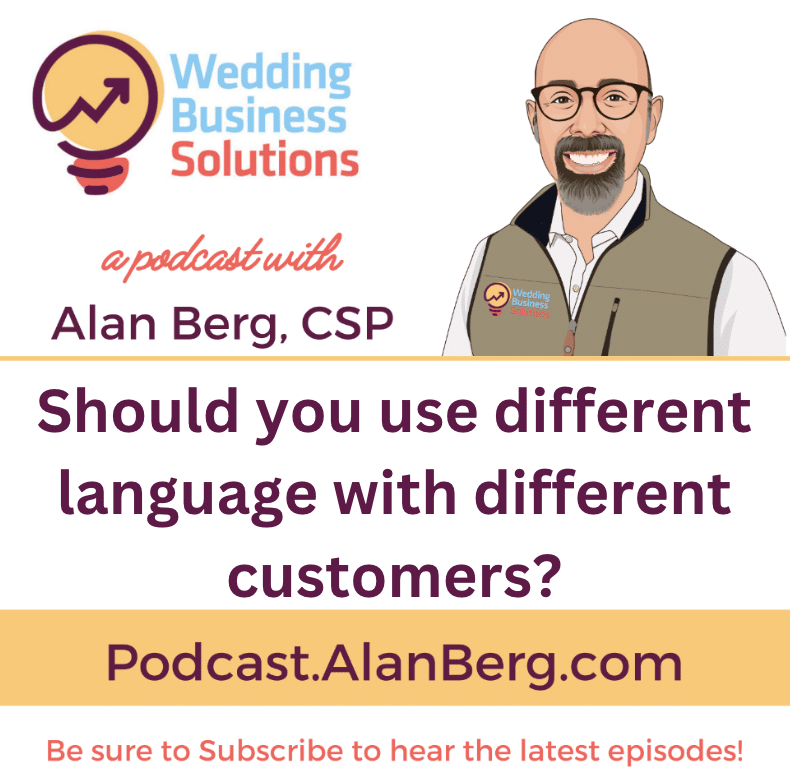 Should you use different language with different customers?
Should you use different language with different customers?
Thanks to Meredith for this listener suggestion. The question they posed is whether you should be using different language with different customers, but I take this even further. Is it age or other factors that will make you change the way you communicate. When those cultural references (TV shows, movies, etc.) start to fall flat with your customers, maybe it’s time to find new ones. Is your language with your family and friends the same as what you use with your couples and clients?
Listen to this new, 9-minute episode for some ideas on when you might, or might not adapt your language.
Listen to this and all episodes on Apple Podcast, YouTube or your favorite app/site:
- Apple Podcast:
- YouTube: www.WeddingBusinessSolutionsPodcast.tv
- Spotify: https://spoti.fi/3sGsuB8
- Stitcher:
- Google Podcast:
- iHeart Radio: https://ihr.fm/31C9Mic
- Pandora:
Below is a full transcript. If you have any questions about anything in this, or any of my podcasts, or have a suggestion for a topic or guest, please reach out directly to me at [email protected] or contact me via text, use the short form on this page, or call 732.422.6362
Please be sure to subscribe to this podcast and leave a review (thanks, it really does make a difference). If you want to get notifications of new episodes and upcoming workshops and webinars, you can sign up at www.ConnectWithAlanBerg.com
– Should you use different language with different customers? Ooh, listen to this one and see what I’m talking about. Hi, it’s Alan Berg. Welcome back to another episode of the “Wedding Business Solutions” podcast. Here is another listener suggestion. Meredith had asked me, when you have different customers, different constituencies if you will, people that you’re communicating with, should you be using different language? Or I guess the alternative is, this is the way I speak, this is the way I write, this is me. And what she was talking about is it’s different if she communicates with a 25-year-old person who’s getting married, let’s say a bride or a groom, versus maybe that person’s mother, right? And different parts of the country, certainly, if you do business in different parts of the country, should you do that?
So it brings up an interesting thing. Are you who you are and this is your language, or do you need to adapt? Now, I would like to say that I am who I am and this is what I do and I do it everywhere that I do it. But if I really think about it, I proudly don’t. I certainly adapt my language to my audience Meaning, if I’m speaking to photographers, I’m speaking a little bit differently than if I’m speaking to florists and I’m speaking to caterers and I’m speaking to officiants. But more of that is about the technical things of what they do so that they know that I understand their business, right? If I’m working with a bridal shop, I’m going to be talking about silhouettes and decolletage and bodices and words that I don’t normally use in my day. And if I’m talking with photographers, I’m going to be talking about the bokeh and I’m going to be talking about the composition and the depth of field and things like that. But those are, again, those are technical things. Other than that, I’d like to think that there’s one version of the truth for me.
Hearing me here, reading my books, seeing me speak onstage, consulting with me one-on-one, I’d like to think that I’m using the same language. Now, that said, I also definitely adapt certain things or have certainly adapted over the years, as I’m sure you have as well. There’s a certain point where, and I’ve said this many, many times, in the 25-plus years that I’ve been in the wedding and event industry, the average couple has gotten about five years older. We get a year older every year. They don’t, right? It’s creeping up. The average couple’s about 30 now in the US. But we have gotten, you know, in the past 25 years, we’ve gotten 25 years older, in the past 10 years, we’ve gotten 10 years older, and they haven’t. And that’s going to continue. So we definitely have been adapting to our consumer. We’ve been adapting language. We’ve been adapting communication style. We’ve been adapting the technology that we use. I remember there was a time when we didn’t use emojis. There was also a time when we were texting and we had to hit the 2 key three times to get the letter C. Some of you are like, “What is he talking about?” And some of you are feeling the pain of that.
We also have to find a tipping point where I think most of you can relate to this where there were references that were working with your couples, or your clients, this is not just a wedding thing, that were working with your customers, that it might be a reference to a TV show or a movie or something like that and you mention it and all of a sudden nobody knows what you’re talking about. That is someplace where we’ve definitely adapted. It’s a painful adaptation because you’d like to think, well, you know what I’m talking about if I mention, fill in the blank, “Gilligan’s Island” or “90210” or whatever it is. But maybe your constituency now doesn’t. Maybe Gen Z doesn’t know what you’re talking about with those things. And the same thing regionally. I know I adapt internationally. Although, it was funny, the first time I spoke internationally was in Barbados and I remember pulling all the cultural references out of my speech because I thought, well, they’re not going to know these things, and I get down to my hotel and I turn the TV on in my room and it’s the New York City TV stations. They knew all the references, they knew all the ads, they knew all the cultural things that we were doing, the TV shows, the movies and all, They knew everything. It was the same thing. I didn’t have to pull those things out.
It wasn’t bad to do it. It was certainly a good exercise. Same thing the first time I spoke in India. Now, we also adapt certain things with certain cultures. You’re dealing with certain people, you’re definitely adapting to them. Many of us have already made our changes there. Some of you are coming along, some of you willingly, some not, in terms of the idea of personal pronouns. I try to use whenever possible, I’m trying to use they and them as much as possible to be inclusive. When I’m making a specific reference to someone and I know their pronouns, I might say he or she or they because I know what they are. So, like, the person that recommended this, I said Meredith and I said she. I think that’s okay. If it’s not, Meredith, you’ll let me know.
So we’re making these adaptations. Some of them are consciously. Some of them we’ve made them and don’t realize that those are adaptations that we made. So should we be talking differently to different people? I think we need to be conscious of what our words mean. The technology we use can lose some of that feeling in there. I think also your language with your friends and your language in business can be different. Some people are looser with certain slang words or curse words or whatever in their personal communication that may or may not be appropriate in business. There are some people that can get away with that. Gary Vaynerchuk uses the F-word like I use punctuation. Works for him, wouldn’t work for me. If I started doing that, I’d have a lot of people going, “What is wrong with Alan today,” right? Jeffrey Gitomer, another one that uses the F-bomb like punctuation. Works for him and his brand, wouldn’t work for me. And I say it wouldn’t work for me. Could I make it work? Probably. I also might lose some of my constituency that is thinking I am having a seizure or I’m on drugs or something like that. So I think the answer is yes, we do adapt to our customers, and I think we have to adapt to the point that we feel it is appropriate but also we feel comfortable with ourselves. If you just don’t feel comfortable talking without using certain language, which could be, again, slang language, it could be, you know, what’s considered foul language to some, it might not be to others, you do it and the consequences are if somebody decides not to do business with you because of that language and you’re okay with it, then you’re okay with it. That’s what it is.
But I think we all have adapted in one way or another. I remember adapting by speaking slower. When I would go, I grew up in the New York area, I lived in the New York area, I live in New Jersey, people here tend to speak faster. If I go down South, I remember years ago, many, many years ago, somebody telling me, “Hey, slow down. You don’t have to talk that fast.” And I’m using the Southern drawl, probably a lousy one, by the way, because that’s what they had and they were like, “You don’t have to talk that fast around here.” Okay, I won’t. I will say that if I go up to Boston and spend more than a day or two there, the letter R starts dropping from my vocabulary and I’m packing my cab in front of the department store. It’s something that if I’m around people speaking a certain way, I speak like them. I try not to do it in a way that would be offensive. But, you know, sometimes it’s subtle. I just find myself doing it, maybe because I’m a musician and speech to me is music, the way people speak and accents are music. I know I try very hard when I’m in England and when I’m in Ireland not to speak with an accent like them. I think part of the charm, I’m doing air quotes here, for them is to hear me with my accent.
Of course, there is no American accent. There is, you know, the accents from different parts of the country, and I joke when somebody says, “Oh, you don’t sound like you’re from New York,” I say, “Well, I could sound like I’m from New York if you want me to. I just choose not to,” right? So we make a joke, everybody laughs, there you go. So are we adapting? Yes. Should we adapt? Yes, to the point that you feel comfortable, to the point that it makes sense for you and your brand and your business and your, if your feel just, if it’s not creating friction internally for you to do that, or externally, yeah, I think it’s fine. So Meredith, thanks for the suggestion and I hope I gave everybody something to think about. Thanks.
I’m Alan Berg. Thanks for listening. If you have any questions about this or if you’d like to suggest other topics for “The Wedding Business Solutions Podcast” please let me know. My email is [email protected]. Look forward to seeing you on the next episode. Thanks.
Listen to this and all episodes on Apple Podcast, YouTube or your favorite app/site:
- Apple Podcast:
- YouTube: www.WeddingBusinessSolutionsPodcast.tv
- Spotify: https://spoti.fi/3sGsuB8
- Stitcher:
- Google Podcast:
- iHeart Radio: https://ihr.fm/31C9Mic
- Pandora:
©2023 Wedding Business Solutions LLC & AlanBerg.com





